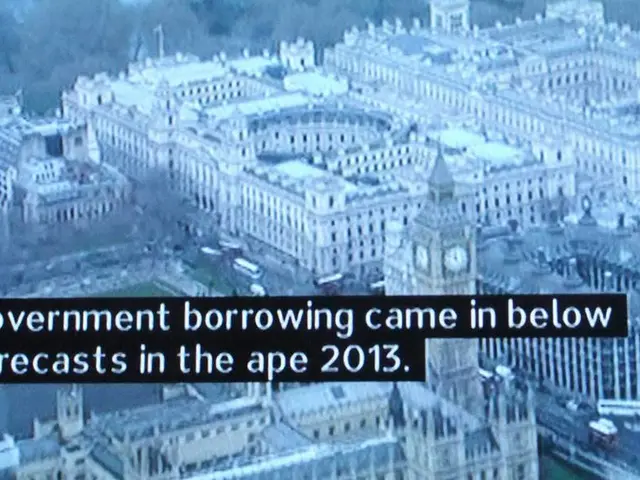BIG NEWS FROM THE WHITE HOUSE
United States Increases Duties on Steel and Aluminum Imports amid OECD Ministers' Meeting
The United States pulled a sneaky move this week, skyrocketing the tariffs on steel and aluminum from 25% to an eyebrow-raising 50% on importing nations, causing quite the fuss among allies and economic organizations alike.
Trump's "take no prisoners" trade war strategy has triggered an unsettling haze over a gathering of ministers from the Organization for Economic Cooperation and Development (OECD), as the President's strained international relations take their toll on the world economy.
The Trump administration's new tariffs on both steel and autos have put US ties with trading partners under immense pressure, reigniting a flurry of negotiations in a desperate attempt to find a compromise and avoid the new duties.
And the pressure keeps growing, as the OECD, a gathering of 38 mostly developed countries, recently cut its global growth forecast due to Trump's trade policies. Consumption, investment, and trade have all been adversely affected by these tariffs, according to OECD chief economist Alvaro Pereira.
Some of Trump's most sweeping tariffs are facing legal challenges, but for now, they remain in place during the ongoing appeals process.
As the smoke clears, the OECD will hold a ministerial meeting on Tuesday and Wednesday. U.S. Trade Representative Jamieson Greer and EU trade commissioner Maros Sefcovic will have some heated discussions on the sidelines of the gathering, with the EU fighting to prevent higher tariffs from July 9th if a compromise isn't reached.
Similarly, U.K. Trade Secretary Jonathan Reynolds will try to ward off fresh tariff hikes on steel and aluminum during his meeting with Greer today. Despite the doubling of tariffs, imports from the U.K. will remain at 25% for now, with both sides working out duties and quotas in line with the terms of their trade pact.
Reynolds and Greer will discuss their shared desire to implement the pact, including agreements on sectoral tariffs, as soon as possible, according to a U.K. readout. The negotiations are crucial, as failure to find an agreement could further strain relations and have severe consequences for both economies.
The European Union strongly regrets Trump's plan to raise metals tariffs, cautioning that it undermines ongoing efforts to reach a negotiated solution with the United States. The bloc is prepared to retaliate in response. Canada, the largest supplier of steel and aluminum to the United States, has called the tariffs "illegal and unjustified."
Time is running out, as the Group of Seven advanced economies is due to hold separate talks on trade on Wednesday. Speaking on the sidelines of the OECD talks, German economy minister Katherina Reiche said that a negotiated solution was needed as quickly as possible because time is running out. French trade minister Laurent Saint-Martin added that it was essential to remain calm and show that the tariffs are not in anyone's interest.
Indeed, Mexico will request an exemption from the higher tariff, arguing that it is unfair because the United States exports more steel to Mexico than it imports. Mexico is highly vulnerable to Trump's trade wars because 80% of its exports go to the United States, its main trading partner.
The United States announced that it would be sending letters to trading partners to press for offers by Wednesday, as a deadline loomed to either reach an agreement or face the consequences. Besides imposing 10% tariffs on almost all U.S. trading partners in early April, Trump had announced higher rates for dozens of economies, including the EU and Japan, as part of his ongoing efforts to pressure countries to correct practices deemed unfair. These higher rates have been paused for 90 days but will expire on July 9th.
Meanwhile, tensions between Washington and Beijing continue to rise, as both sides have imposed significant tariffs on each other's exports. The Trump administration has taken special aim at China this year, imposing additional tariffs of 145% on Chinese imports and triggering Beijing's counter-tariffs of 125% on U.S. goods. While both sides agreed to temporarily de-escalate in May, Trump has since accused China of violating the deal. The latest source of tension lies in China "slow walking the approval" of critical mineral exports and rare earth magnets, according to U.S. Deputy Treasury Secretary Michael Faulkender. However, he maintained that Washington is making "good progress" overall in talks.
In simpler terms: The United States has raised the stakes with its steel and aluminum tariffs, causing a massive headache for its trading partners and potentially hurting the global economy. The European Union, Mexico, Canada, and even China are feeling the heat as they struggle to find a solution and avoid further tariffs. Only time will tell how this rollercoaster of trade tensions will evolve.
- The OECD (Organization for Economic Cooperation and Development) has expressed concern over the impact of the tariff increases in the finance sector, as the global economy is at risk due to the strained international relations and the adverse effects on consumption, investment, and trade.
- The escalating trade tensions between the United States and its allies, including Europe, Mexico, and China, have created a ripple effect in the industry and general news, with policymakers and economists closely watching the negotiations to find a compromise and avoid higher tariffs.







